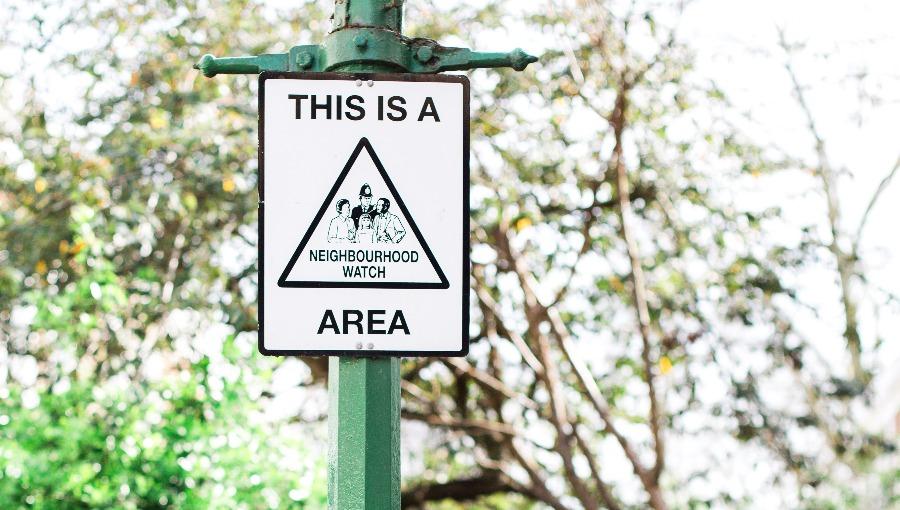Craig Johnson
Seller Beware: Your Online Ad Draws Scammers
We are instinctively cautious when purchasing from strangers, but scammers also pretend to be buyers. Learn to spot them.

You have surely heard the advice, "Buyer beware." This is especially true if you want to buy something from a private party using Craigslist, Facebook Marketplace, or another anonymous flea-market type of website. But nowadays it is equally important for sellers to beware.
Last month my mother put up for sale on Craigslist a gently used upright walker. Her husband had used it a couple of weeks while suffering back problems that, thankfully, he recovered from much quicker than expected. Less than an hour after posting the ad, she got a peculiar reply.
Search Anyone FreeThe first thing a scammer is happy to have is our attention. With text message blocking and Caller ID and filtered email inboxes, it has become increasingly easy to shield ourselves from solicitors and hucksters. Scammers have a hard time getting to us. But list something for sale, and you've just said to the scammers, "I'm listening." They know you will be answering your phone, watching your email, giving every stranger's text message as much attention as you do the messages of people you know. Disguising themselves as interested buyers, just ordinary members of the public, they have cover to approach you.
Craigslist offers semi-anonymous email addresses. Use that for all correspondence. Your posting will display a temporary address, and messages sent there will get relayed to your actual address. This keeps your email address private. The relay is deactivated when your posting expires.
Not only did my mother's ad for the upright walker tell scammers she was standing by to hear from them, but it also told them they were probably dealing with a senior citizen. Seniors lose an estimated $2.9 billion annually from financial exploitation, according to the Senate Special Committee on Aging. Most victims of online fraud, however, are people in their 20s, probably due to inexperience, placing a low value on their personal privacy, and not keeping their guard up when they're online.
My mother texted me. "I got a reply in less than an hour. Check your email and give me feedback, please."
She had forwarded the message to my inbox. I opened it to read the following (all typos original):
Thanks for the response and am satisfied with the price and the condition on the list, kindly withdraw the advert from list and considered it sold. I will add extra $100 with the original price while you remove the ads. ,My husband will overnight a Cashier Check/Certified Check drawn from a local Banks, and i will make the pick up arrangement as soon as you have the check clear and your have your cash, I would have loved to come and take a look and purchase with cash, but my work (nurse) is tight. So, I'll need you to provide me with the following information to overnight the Payment.
*Full Name on the Check
*Full Physical Address
*Final asking price and your cell# to get a hold of you.
The check will be overnight to you asap and deliver to you within 24hours.Thanks
I called my mother and gave her the news that she was dealing with one of today's most common scams plaguing sellers on Craigslist and in other anonymous marketplaces.
The Cashier's Check Scam
The message my mother received is a textbook example of the Cashier's Check Scam. The immediate offer to buy is intended to delight the seller. "Look how easy it was to sell my item! I hardly did anything."
The offer to pay extra if the seller removes the ad has a twofold purpose of appealing to the seller's desire for quick money and making sure that the conman has the mark (my mother) all to himself.
The mention of a cashier's check is meant to assuage any fears the mark might have of being scammed. After all, a cashier's check is regarded as an unimpeachable method of payment, the kind of payment that parties rely on when they don't trust each other.
The scammer added that the check will come from "a local Banks." Bizarre capitalization and bad grammar aside, with this detail the conman hoped to reassure my mother that she is dealing with a neighbor, not a stranger. A friendly neighbor who will pop into a known bank and get a check with an extra $100 bonus just as soon as my mother takes down the ad.
In case you're wondering how the scammer intends to forge a cashier's check, it is apparently quite easy. What's worse is that banks will perfunctorily cash them and then hold you responsible when the fraud is discovered days or weeks later. The forgery only has to go undiscovered a few days, and since the Federal Reserve Bank can take a couple of weeks to verify bank-issued cashier's checks, scammers have all the time they need. In one form of the Cashier's Check Scam, the check is "accidentally" made out for too much, and the buyer wants you to send the extra money to an apparent third party.

But there might not even be a cashier's check when the scam unfolds. Cons work in part by getting your agreement on one plan then changing it incrementally, with no change big enough on its own to scare you off. The excuse might be a technical problem or a paperwork hassle. Upon supposedly returning from a local bank, the scammer might write my mother to say, "It would be faster and easier if I could just transfer the money directly into your checking. Could you tell me your routing and account numbers, or better yet, just send me a quick picture of a blank check. Thanks!"
Just like that, the scammer has four pieces of personal information. His message required your full name as it appears on your checking account, your home address, and your phone number. Now with the cashier's check switcheroo, he has your checking account too.
And that's just a start. The best conmen know how to draw out more and more personal (but seemingly harmless) information by gaining your trust, by gaining your confidence.
Remember my mother's example. The scammer who wrote my mother tried to pass himself off as (1) a woman; (2) a nurse; (3) married; (4) and local. Look how artistically the deception is woven into the message when none of those details has anything to do with buying a used upright walker.
The details are peppered throughout the message to gain your trust. Victims of conmen usually look back with shock over how much trust they put in a perfect stranger, how vulnerable they made themselves gradually, one piece of info at a time.
It's fun dissecting this kind of fraud attempt and marveling at the boldness behind it, but serious harm can result. In 2016, there were about $8 billion worth of check fraud attempts, which cost the bank about $790 million.
How to Spot a Harmful Reply to Your Online Sale
Wow, an immediate sale for more than your asking price, and paid for with a foolproof cashier's check! It sounds too good to be true. Well, it is.
Notice bad spelling and grammar. Look for odd word choices, phrases, and capitalization. While plenty of good people did not learn English as their first language, it's also a fact that many scams originate in foreign countries.
Watch out for attempts by the buyer to cloak himself in trustworthy details, like he's a fireman or a doctor or a member of the armed services. Be suspicious of the offering of any personal details in what should be an impersonal sale. Since the info has nothing to do with the sale, it's probably there to dupe you into trusting.
The so-called buyer wants to get the money transaction out of the way, before discussing details of when and where to take possession of your sale item. You might say to yourself, "They must really trust me to pay me up front, so I should trust them." They hope you say that! The money transaction is the ripoff. No wonder the scammer wants to do that part right away.
The more a buyer tries to avoid paying cash, the more wary you should be. If he can't pay cash, he's not really local. If his alternative to cash is "so fast and easy," well, he can use that method to get cash, can't he? Name one financial instrument that the buyer can't turn into cash before the sale yet you could more easily turn into cash after.
To recap the ways you can spot bogus replies to your online sale that intend to talk you out of your personal financial information:
- Believe that if the offer sounds too good to be true, it's a scam.
- Look for bad spelling, grammar.
- Any personal details that the buyer volunteers about himself or herself are superfluous to the sale and should make you suspicious.
- If the buyer says that another payment method is easier than cash or "just like cash," let him use that method to get the cash. If he can't pay cash, he's very probably not the local he says he is.
Protect Yourself When Selling Online
Never lose sight of how easy a transaction between two parties really is. You have something for sale, someone else wants to buy it, you meet in a public place by day, and exchange the item for cash.
Scammers will try to complicate each step of the process. They tell you about themselves, sprinkle in little confidence-building details here and there when none of that matters to the sale. The cash transaction gradually becomes, say, a direct deposit into your checking account or a cashier's check that (oops!) includes an extra $1,000 instead of the agreed-upon $100, and could you simply refund the difference?
"Deal locally with folks you can meet in person," is Craigslist's number-one piece of advice for avoiding scams. "Follow this one simple rule and you will avoid 99% of the scam attempts on craigslist."
Keep the sale impersonal and simple as follows:
- Write no personally identifying information in your ad. Use Craigslist's anonymized email relay.
- Insist on the transaction taking place in public in daytime, assuming that the item is portable. Suggest to meet by the entrance of a Target or supermarket, someplace you will be on camera.
- Take plenty of pictures of the item from all angles in plenty of light. Send those to interested buyers. Don't agree to an in-home look. They want a better look before the public meetup? Send another picture. Amazon sells items solely by picture, and so can you.
- For items so heavy they must be picked up at home, don't meet the buyer at your home alone. Ask a relative to come over, or invite a friend for lunch. Same goes if you're dropping off the item at the buyer's location. Bring someone with you.
- Insist on a cash sale. Reject any financial instrument that shifts the burden to you, no matter how easy a buyer says a check or an escrow service or plastic gift cards would be. Be ready to say, "That does sound easy! So you go ahead and do that to get the cash, and then get back to me."
The thing with the Cashier's Check Scam is that as the scam unfolds, there might not be a cashier's check. That trustworthy method of payment could be mentioned up front to ease your doubts and dissuade you from further critical thinking.
There also probably won't be any meetup with this kind of scam, thank goodness. The scammers are probably writing from thousands of miles away. What the conmen want is your data, your financial info. They want your cooperation in a seemingly harmless money transaction for the sale of your item, and once you realize you have been ripped off, they are long gone. When they know or suspect that their mark is a senior citizen, they work even harder and more deviously.
I shudder to think about it, but I bet if my mother had agreed to meet the (ahem) married female local nurse who supposedly wanted to buy the item, that is not who would have shown up at the door. (I just thought of this: The message also mentioned a husband—that provides cover for a man to show up in place of a woman.)
My mother did acquiesce to one of the scammer's demands: She took down the ad immediately, per my advice. My brother-in-law the next town over has since picked up the walker and will be handling the sale.
Search Anyone Free



